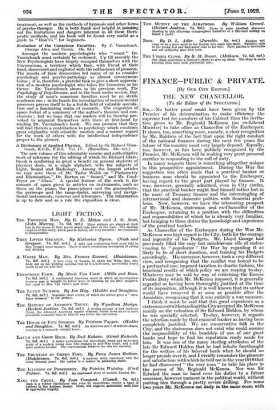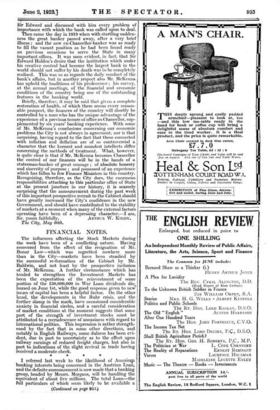FINANCE-PUBLIC & PRIVATE.
[By OUR CITY EDITOR.]
THE NEW CHANCELLOR.
[To the Editor of the SPECTATOR.] SIR,—No better proof could have been given by the Premier of his determination to make efficiency the supreme test for members of his Cabinet than the invita- tion given to Mr. Reginald McKenna (an ex-Liberal Minister) to take office as Chancellor of the Exchequer.
It shows, too, something more, namely, a clear recognition by Mr. Baldwin of the fact that upon the right conduct of the national finances during the next few years the future of the country must very largely depend. Equally, too, however, as has been publicly recognized by the Premier, Mr. McKenna will be making very great personal sacrifice in responding to the call of duty.
In many respects there is something altogether unique in this prospective appointment. During the War the suggestion was often made that a practical banker or business man should be appointed to the Exchequer. having regard to the great part played by finance. It was, however, generally admitted, even in City circles, that the practical banker might find himself rather lost in the maze of Treasury finance and the intermingling of international and domestic politics with financial prob- lems. Now, however, we have the interesting prospect of Mr. McKenna, statesman and ex-Chancellor of the Exchequer, returning to a position with the difficulties and responsibilities of which he is already very familiar, but bringing to those duties the knowledge and experience of the practical banker.
As Chancellor of the Exchequer during the War Mr. McKenna won high regard in the City; both for the courage and ingenuity of his Budgets. Mr. Lloyd George had previously filled the easy but mischievous role of endea- vouring to " popularize ' the War by regarding it as likely to be of short duration, and framing his Budgets accordingly. His successor, however, took a very different view, and recognizing that the conflict was bound to be a protracted one, imposed taxation in drastic fashion, the beneficial results of which policy we are reaping to-day. Whatever may be said by way of criticizing the Excess Profits Duty which Mr. McKenna imposed, it is generally regarded as having been thoroughly justified at the time of its imposition, although it is well known that its author would have removed it as soon as possible after the Armistice, recognizing that it was entirely a war measure.
I think it must be said that (his great experience as a statesman notwithstanding) the City accepted Mr. McKenna mainly on the valuation of Sir Edward Holden, by whom he was specially selected. To-day, however, it regards the selection made by that eminent banker as having been completely justified. We are conservative folk in the City, and the statesman does not exist who could assume the responsibility of the headship of one of our great banks and hope to find his reputation ready made for him. It was one of the many sterling attributes of the late Sir Edward Holden that he had infinite forethought for the welfare of his beloved bank when he should no longer preside over it, and I vividly remember the pleasure and satisfaction with which he told me in the year1916 that he had discovered " the very man " to take his place in the person of Mr. Reginald McKenna. Nor was Sir Edward the man to hand over his duties to a future successor, however eminent in the political world, without putting him through a pretty severe drilling. For some two years Mr. McKenna sat daily in the same room with Sir. Edward and discussed with him every problem of Importance with which the bank was called upon to deal. Then came the day in 1919 when with startling sudden- ness the great banker passed away, after a very brief Illness ; and the new ex-Chancellor-banker was as ready to fill the vacant position as he had been found ready on previous occasions to serve the State in many important offices. It was soon evident, in fact, that Sir Edward Holden's desire that the institution which under his creative control had become the largest bank in the world should not suffer by his death was to be completely realized. This was so as regards the daily conduct of the bank's affairs, but in another respect also Mr. McKenna has upheld the traditions of his predecessor ; his survey, at the annual meetings, of the financial and economic conditions of the country being one of the outstanding features in the banking world. Briefly, therefore, it may be said that given a complete restoration of health, of which there seems every reason- able prospect, the finances of the country will shortly be controlled by a man who has the unique advantage of the experience of a previous tenure of office as Chancellor, sup- plemented by six years' banking experience. With some of Mr. McKenna's conclusions concerning our economic problems the City is not always in agreement, nor is that surprising, having regard to the fact that those connected with inflation and deflation are of so controversial a character that the keenest and soundest intellects differ concerning the methods of treatment. What, however, is quite clear is that if Mr. McKenna becomes Chancellor the control of our finances will be in the hands of a statesman-banker of great courage ; of absolute honesty and sincerity of purpose ; and possessed of an experience which has fallen to few Finance Ministers in this country. Recognizing, therefore, as the City does, the enormous responsibilities attaching to this particular office of State at the present juncture in our history, it is scarcely surprising that the announcement during the past week of this important prospective recruit to the Cabinet should have greatly increased the City's confidence in the new Government, and should have contributed to the stability of markets at a moment when many of the external factors operating have been of a depressing character.—I am,











































 Previous page
Previous page